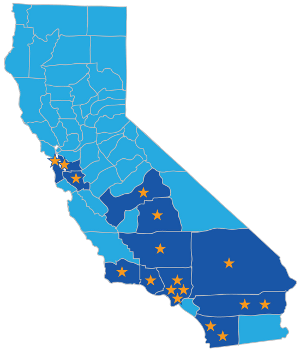In the last two weeks, 37 organizations regrouped in Southern California and the Bay Area pivoting plans to support and qualify a ground-breaking compromise initiative to raise billions in new revenue for California, stop draconian cuts to education and services, and begin to restore fairness to our tax system.
This compromise represents a new turning point in our journey to reorient California’s tax and budget policies towards equity and fairness.
How We Got Here
In December, with strong support from a diverse coalition of allies, the California Calls Action Fund joined with the California Federation of Teachers and the Courage Campaign to file a “Millionaires Tax” Initiative. The measure was proposed to hike the tax rate on the super-rich, raising a projected $6 to $8 billion earmarked for K-12, higher education, health and human services, and public safety.
After three months of intense organizing, the Millionaires Tax Coalition gathered 592,000 signatures and continued to build broad public support, demonstrated in five public opinion polls. On March 14, California Calls and our partners decided to join forces with Governor Brown and key labor unions to set aside our separate proposals in favor of a stronger and unified initiative.
In a matter of days, we helped to create the most progressive income tax measure in the entire nation—and demonstrated the power of our grassroots labor and community coalition to forge an agreement with the traditional Sacramento centers of power.
How the New Measure Compares
In summary, here’s what the new compromise measure does:
1. Of the projected $9 billion raised in the first year, $8 billion will come from a progressive income tax increase for individual Californians making more than $250,000 a year or households making more than $500,000 per year. No one making less than $250,000 a year will see an income tax increase.
2. Over the next seven years, the wealthiest 2% of Californians will pay more every year in higher income taxes. We garnered two more years than the Governor’s original proposal.
3. The new measure reduces the Governor’s proposed sales tax increase from ½ cent to ¼ cent, and stays in place for just four years.
4. 85% of the revenue will be from the higher bracket income taxes, and only 15% will be from the ¼ cent sales tax.
5. A replenishment of the General Fund will help restore numerous programs including K-12, community colleges, police and fire, and programs for seniors, the disabled and poor.
6. Makes permanent the public safety “realignment” of 2011, guaranteeing funding for local governments who take on responsibility for non-violent offenders transferred out of costly state prisons.
California Calls supports this new measure because:
• The vast majority of the new revenue comes from the wealthy (almost 90% vs. 60% in the governor’s original).
• Though we don’t like the sales tax, the new measure cuts the proposed sales tax increase in half.
• The revenue is intended to address multiple needs: education, social services, realignment and the budget deficit.
• It allows for a more united effort to pass a badly needed revenue measure this year. Winning will require a united movement.
Compared to the Governor’s original proposal the new measure represents an increase in the tax rate on the very highest incomes of between 1% and 3%, more money — around $2 billion in the first year — to restore cuts, and a 50% decrease in the sales tax.
The future of higher education was one of the most pivotal points in our intense negotiations. Compared to the Millionaires Tax, the new measure does not earmark funds for the CSU and UC systems.
The Governor, Senate Pro-Tem Steinberg, Speaker Perez and other elected leaders publicly committed work so that a portion of the new revenues will be used to support the CSU and UC systems.
Now, it is up to us to hold the elected leaders of Sacramento to their word.
“We must hold them accountable,” said Dolores Huerta during the Southern California meeting. “We need to organize our elected officials to meet with hundreds in our own communities. We will tell them to honor their commitment to keep California’s colleges open and affordable to all.”


